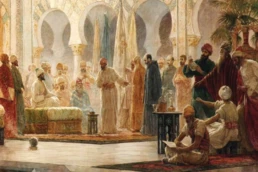5 min read
A matter to highlight is that we are very different from our American brethren, and it doesn’t work well with our interests to assume that their issues are ours, or the same. The problems that arise from this is that we are unable then to address our own unique set of circumstances constructively that are shaped by different variables.
Of course, I have my own views on each of the following, but my point here isn’t to make value judgements about our cultural, political and social reality, nor to say anything about the variables that impact on the difference, but merely point them out for those who haven’t considered them:
1. The ethnic makeup of US Muslims varies wildly from the UK. Most Muslims in the UK are of South Asian ethnic heritage, particularly Pakistani and Bangladeshi backgrounds, and specifically of a Mirpuri and Sylheti cultural background. All other ethnicities pale in demographic comparison. Along with the Gujrati (Indian) culture, those two particular cultures have had a profound impact on the ethno-religious culture in the UK, in shaping a religious outlook, and what it means to be Muslim in the social and political sphere. Post-colonial narratives among these diaspora (and consequent generations) have deeply entrenched outlooks and attitudes towards socialisation, integration, political identity, and religious methodology.
2. The desire for such ethnic groups to protect and maintain their cultural norms, values and communities has meant that they are particularly averse to the indigenisation of Islam in Britain, and many tend to view Islam culturally in-tune with Britain suspiciously (as opposed to Islam culturally in-tune with Pakistan/Bangladesh/India/the Arab Gulf). Whilst this also exists in the US it’s nowhere near the same level across the board.
3. We differ socio-economically, which has also had an impact on levels of education. These ethnic groups which make up the majority of Muslims in the UK are at the lower end of socio-economic strata, which has also had a major impact on levels of educational attainment. As a result and in comparison, US Muslims are far more willing to explore matters of faith and philosophise on variant ways of thinking than their British counterparts. Where there is an aversion to indigenisation or certain views (in the US), it’s often but not always ideological rather than cultural.
4. Muslims in the US (in comparison) tend to have more resources, and a better level of integration has meant that they invest more in their own communities, and higher educational attainment has meant such resourcing is more meaningful and resultantly more productive. This means that the religious services on offer are better, that American scholars (in general) are empowered to explore issues at a deeper level, and also have wider reach. Whilst many British Muslims would like much the same, there seems to be a sense of entitlement with little thought about where it’ll come from and how it’s produced.
5. Issues around race, ideologies, activism, economics etc in the US are completely unlike the UK. Our laws differ, which has had an impact on how society engages with these things, how it reacts, and what is deemed acceptable (the overton window). For Brits, the way these issues manifest in the US can seem like they’re on steroids! For Brits to speak on these matters in the way that they are a reality in the US can be harmful to the British conversation as they’re disanalogous. Similarly, for Brits to criticise the Americans (or vice versa) can often be misplaced since one is viewing the other through the lens of their own reality.
6. Celebrity culture is particularly potent in the US, and Brits tend to be far more understated. As a result, it can seem that there are far more public Muslim thinkers/scholars in the US whereas the case tends to be that astute British scholars are simply unknown on the wider public scene due to both a legitimate and illegitimate reticence to being in the limelight – it’s not simply the case that they don’t exist. Another impact of being understated is that British scholars do not manifest their evolution of thinking and maturation in public taking everyone else on the ride whilst they shift wildly from one position to the other. Brits tend to mature first and then engage with somewhat stabilised views (that can be both right or wrong) so they tend to manifest more consistency.
7. On average, American Muslims tend to value western academic post-graduate studies in Islam more than Brits. Brits tend to value singularly shar’i learning more (some refer to it as traditional or confessional learning). Of course, there are pros and cons to both approaches but the point is that this also has an impact on modes/structures of thinking, presentation, and theological narratives.
8. Pedagogy and philosophical modes of thinking differ from one place to another, and as people who’ve been through variant schooling systems its bound to have an impact on the way scholars intellectually approach the shari’ah. This isn’t necessarily a good or bad thing – the difference between mad’habs also exist for this reason. People will have their preferences, to the extent that some Americans will prefer the British way, and vice versa.
Please note that these points are made in the general – there are caveats to all of them which I identify. Some of these points are well established in studies and statistics, others are anecdotal. Of course, feel free to disagree!
Now it’s beyond the scope of a short post here, but these things (as well as others) has meant that the way in which British scholars might speak about contemporary issues, such as racism, feminism, liberalism, politics, theology, Islamic law etc, and how then shar’i thinking manifests in relation to these things (and others) not only differs, but should do. That’s not to say that there isn’t crossover or that one cannot benefit the other, but we should be aware of these differences especially when it comes to practicalities or critique.
Related Posts
2 Comments
Add comment Cancel reply
This site uses Akismet to reduce spam. Learn how your comment data is processed.





Jazak Allah Khair for this article, shaykh! How would you compare the quality and breadth of traditional Islamic learning between both countries?
Us muslims are 10x more Libral than UK muslims. If UK muslims came to USA they would notice most of their beliefs are like that of the KKK (Ku Klux Klan) than that of US muslims. The US muslims tend to have more of a open mind, like they’re Anti death pentaly, pro Israel,Pro LGBTQ, anti rasict, anti Sharia, pro abortion and more. While UK muslims are the complete opposite.